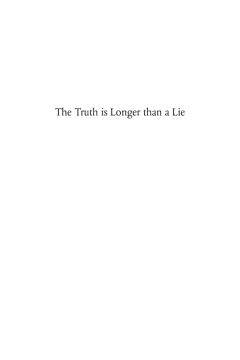
Additional Information
Book Details
Abstract
All too often child victims of abuse either remain silent or are not listened to when they do decide to speak of their experiences, but The Truth is Longer Than a Lie gives abused children and young people a voice.
This groundbreaking book reveals what young victims have to say about abuse and its effects on their lives; their views on the reasons for abuse; their opinions of abusers and non-offending parents; and how they felt about disclosing their experiences. Significantly, this book provides important insights into children's perceptions of the professionals who intervened - to protect them, to prosecute the abuser or to provide therapeutic counselling. The authors examine societal factors that increase children's vulnerability, and propose measures for preventing abuse. They outline the requirements of ethically sound research, including appropriate interviewing techniques, and conclude with recommendations for future research.
The Truth is Longer Than a Lie is invaluable reading for social workers, child protection workers, counsellors, legal professionals and anyone working with abused children.
This excellent book places the voices of child victims of abuse at the centre of an exploration of their experiences. That this should be seen to be a unique approach to the subject is bot sobering and exciting... The book will be of interest to social workers, child protection workers, academics, students and anyone working with abused children. From my perspective as a Lecturer in Social Work, I found the approach and subject matter resonated with the wider movement towards including and responding to the views of service users in both education and practice.
Journal of Children's Services
Neerosh Mudaly has a doctorate in social work and 28 years' clinical practice experience, including 12 years in child protection and 16 as a child and family therapist. She is an expert in the field of child abuse, with experience spanning clinical supervision, training and consultancy and legal advocacy as an expert court witness. She has a strong child-centred approach to practice and training and has previously authored several journal articles on child abuse. Chris Goddard is a professor of child care social work who has previously published in the field of child protection. Together with Dr. Janet Stanley he authored In the Firing Line, and he contributed a chapter to Children Taken Seriously, eds. Jan Mason and Toby Fattore, also published by Jessica Kingsley Publishers. He is Director of the National Research Centre for the Prevention of Child Abuse at Monash University, Melbourne, Australia.
Table of Contents
| Section Title | Page | Action | Price |
|---|---|---|---|
| Foreword | |||
| Preface | |||
| 1 INTRODUCTION: African Proverbs as Tools for Organizational Improvement | |||
| Proverbs and Their Use | |||
| Proverbs for Communicating Organizational Issues | |||
| The Audience for This Book | |||
| CHAPTER 1: Understanding Organizational Growth | |||
| Phases of Organizational Growth. | |||
| Ubuntu: The Spirit of a Sustainable Organization | |||
| Growth Phases Viewed Globally | |||
| CHAPTER 2: Strengthening Organizational Sustainability Conventional Understanding of Organizational Sustainability | |||
| Organizational Development Understanding of Sustainability | |||
| Complementarity of the Two Approaches | |||
| CHAPTER 3: Organizational Culture as the Foundation for Sustainability | |||
| What is Organizational Culture? | |||
| Organizational Identity | |||
| Types of Culture | |||
| Creating an Empowering Organizational Culture | |||
| CHAPTER 4: Improving Leaders' Effectiveness | |||
| Leadership and Leadership Styles | |||
| Developing Leadership Effectiveness | |||
| Leadership Succession | |||
| CHAPTER 5: Improving Consultants' Effectiveness | |||
| Role of the Consultant | |||
| Lessons for Consultants | |||
| CHAPTER 6: Organizational Assessment Using Proverbs | |||
| What is an Organizational Assessment? | |||
| The Purpose of an Organizational Assessmen | |||
| The Benefits of a Self-Assessment | |||
| The Organizational Self-Assessment Process | |||
| Factors Hindering Effective Use of Organizational Assessments . APPENDIX: Sample Diagnostic Instruments | |||
| Proverbs Self-Assessment Tool for Organizations | |||
| Self-Reflection Tool for Leaders | |||
| Self-Reflection Tool for Consultants | |||
| References |
